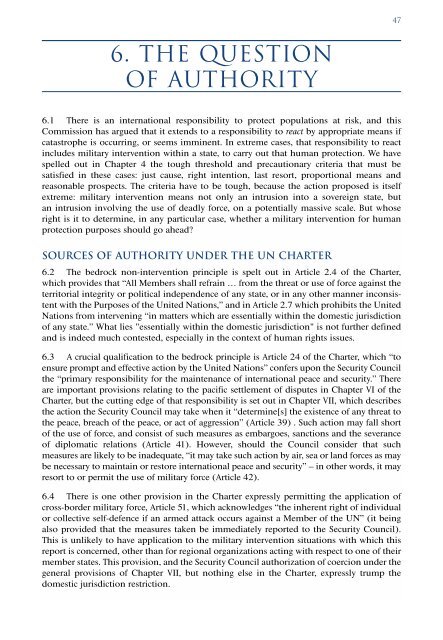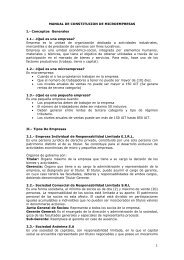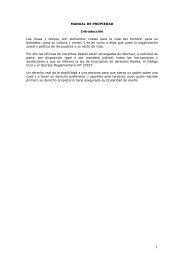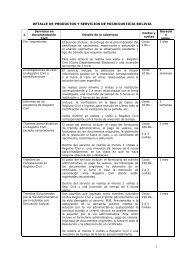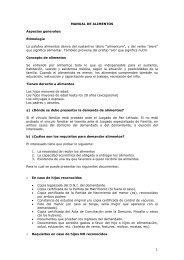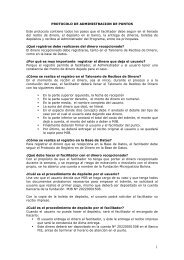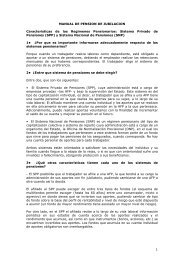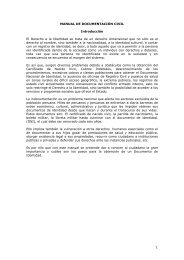ICISS report - International Coalition for the Responsibility to Protect
ICISS report - International Coalition for the Responsibility to Protect
ICISS report - International Coalition for the Responsibility to Protect
Create successful ePaper yourself
Turn your PDF publications into a flip-book with our unique Google optimized e-Paper software.
47<br />
6. THE QUESTION<br />
OF AUTHORITY<br />
6.1 There is an international responsibility <strong>to</strong> protect populations at risk, and this<br />
Commission has argued that it extends <strong>to</strong> a responsibility <strong>to</strong> react by appropriate means if<br />
catastrophe is occurring, or seems imminent. In extreme cases, that responsibility <strong>to</strong> react<br />
includes military intervention within a state, <strong>to</strong> carry out that human protection. We have<br />
spelled out in Chapter 4 <strong>the</strong> <strong>to</strong>ugh threshold and precautionary criteria that must be<br />
satisfied in <strong>the</strong>se cases: just cause, right intention, last resort, proportional means and<br />
reasonable prospects. The criteria have <strong>to</strong> be <strong>to</strong>ugh, because <strong>the</strong> action proposed is itself<br />
extreme: military intervention means not only an intrusion in<strong>to</strong> a sovereign state, but<br />
an intrusion involving <strong>the</strong> use of deadly <strong>for</strong>ce, on a potentially massive scale. But whose<br />
right is it <strong>to</strong> determine, in any particular case, whe<strong>the</strong>r a military intervention <strong>for</strong> human<br />
protection purposes should go ahead?<br />
SOURCES OF AUTHORITY UNDER THE UN CHARTER<br />
6.2 The bedrock non-intervention principle is spelt out in Article 2.4 of <strong>the</strong> Charter,<br />
which provides that “All Members shall refrain … from <strong>the</strong> threat or use of <strong>for</strong>ce against <strong>the</strong><br />
terri<strong>to</strong>rial integrity or political independence of any state, or in any o<strong>the</strong>r manner inconsistent<br />
with <strong>the</strong> Purposes of <strong>the</strong> United Nations,” and in Article 2.7 which prohibits <strong>the</strong> United<br />
Nations from intervening “in matters which are essentially within <strong>the</strong> domestic jurisdiction<br />
of any state.” What lies "essentially within <strong>the</strong> domestic jurisdiction" is not fur<strong>the</strong>r defined<br />
and is indeed much contested, especially in <strong>the</strong> context of human rights issues.<br />
6.3 A crucial qualification <strong>to</strong> <strong>the</strong> bedrock principle is Article 24 of <strong>the</strong> Charter, which “<strong>to</strong><br />
ensure prompt and effective action by <strong>the</strong> United Nations” confers upon <strong>the</strong> Security Council<br />
<strong>the</strong> “primary responsibility <strong>for</strong> <strong>the</strong> maintenance of international peace and security.” There<br />
are important provisions relating <strong>to</strong> <strong>the</strong> pacific settlement of disputes in Chapter VI of <strong>the</strong><br />
Charter, but <strong>the</strong> cutting edge of that responsibility is set out in Chapter VII, which describes<br />
<strong>the</strong> action <strong>the</strong> Security Council may take when it “determine[s] <strong>the</strong> existence of any threat <strong>to</strong><br />
<strong>the</strong> peace, breach of <strong>the</strong> peace, or act of aggression” (Article 39) . Such action may fall short<br />
of <strong>the</strong> use of <strong>for</strong>ce, and consist of such measures as embargoes, sanctions and <strong>the</strong> severance<br />
of diplomatic relations (Article 41). However, should <strong>the</strong> Council consider that such<br />
measures are likely <strong>to</strong> be inadequate, “it may take such action by air, sea or land <strong>for</strong>ces as may<br />
be necessary <strong>to</strong> maintain or res<strong>to</strong>re international peace and security” – in o<strong>the</strong>r words, it may<br />
resort <strong>to</strong> or permit <strong>the</strong> use of military <strong>for</strong>ce (Article 42).<br />
6.4 There is one o<strong>the</strong>r provision in <strong>the</strong> Charter expressly permitting <strong>the</strong> application of<br />
cross-border military <strong>for</strong>ce, Article 51, which acknowledges “<strong>the</strong> inherent right of individual<br />
or collective self-defence if an armed attack occurs against a Member of <strong>the</strong> UN” (it being<br />
also provided that <strong>the</strong> measures taken be immediately <strong>report</strong>ed <strong>to</strong> <strong>the</strong> Security Council).<br />
This is unlikely <strong>to</strong> have application <strong>to</strong> <strong>the</strong> military intervention situations with which this<br />
<strong>report</strong> is concerned, o<strong>the</strong>r than <strong>for</strong> regional organizations acting with respect <strong>to</strong> one of <strong>the</strong>ir<br />
member states. This provision, and <strong>the</strong> Security Council authorization of coercion under <strong>the</strong><br />
general provisions of Chapter VII, but nothing else in <strong>the</strong> Charter, expressly trump <strong>the</strong><br />
domestic jurisdiction restriction.


